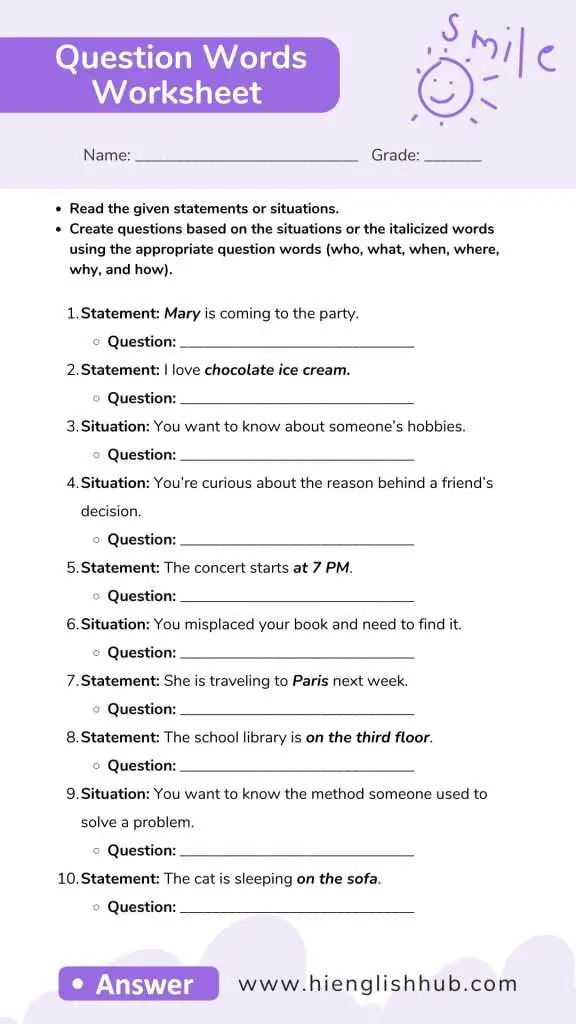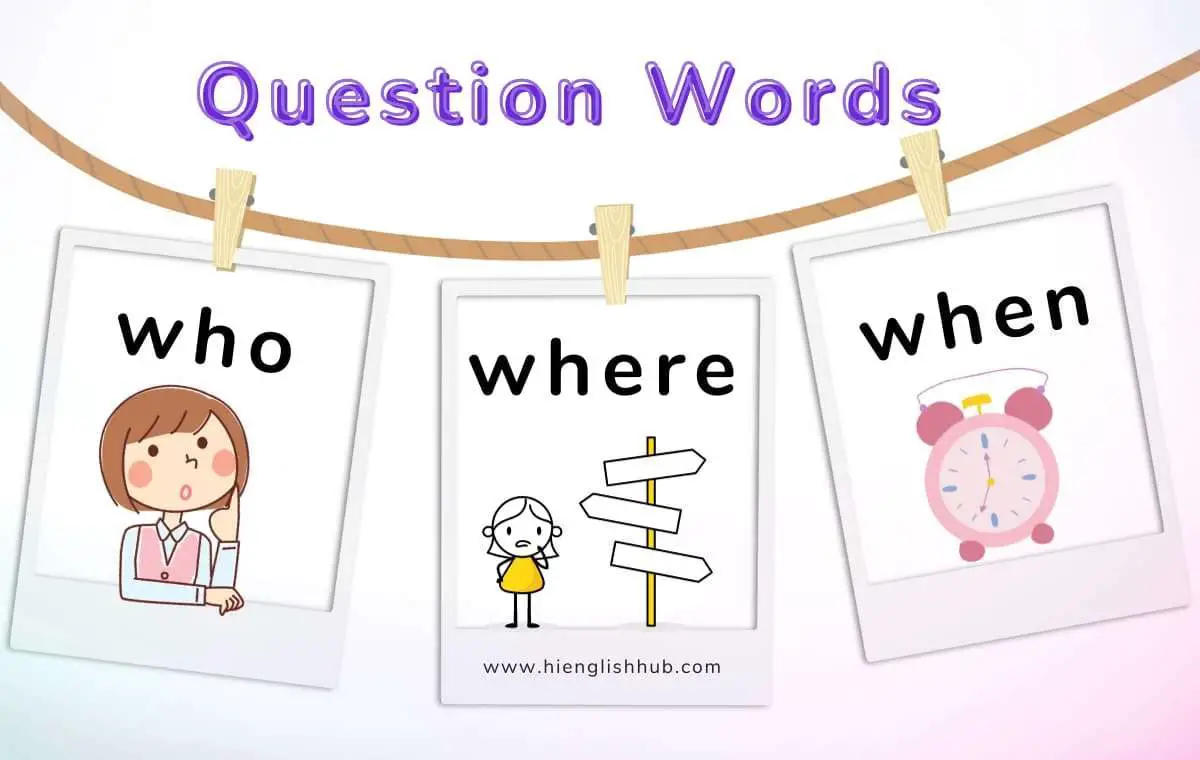You might be familiar with question words in Spanish, German, and Italian, but have you ever delved into the unique world of English question words?
These tiny powerhouses are the secret sauce that adds that extra flair to our conversations!
From the classic “who” to the mysterious “why,” we’re unraveling the secrets of asking and answering questions in English.
So, grab a comfy seat and a cup of your favorite beverage. Let’s roll!
What Are Question Words?
Question words are like secret agents in the world of sentences.
They help us gather specific details by asking different types of questions. These words include “what,” “when,” “who,” “where,” “why,” and “how.”
Think of them as the keys to unlocking the stories hidden within our everyday conversations.
Wh Question Words
What – Unveiling Things and Actions
What is the word that opens the door to things and actions.
It invites us to explore the essence of something or someone. “What are the habits of successful students?” or “What are you doing this weekend?” are classic examples.
When – Navigating Time
When is our trusty guide when it comes to time-related questions.
It helps us pinpoint moments in the past, present, or future.
“When is your birthday?” or “When did you start visiting HiEnglishHub.com?” are perfect instances.
Who – Discovering People
Say hello to “who,” our friendly detective word.
It introduces questions about individuals or groups.
For example, “Who is your favorite author?” or “Who won the soccer game?”
Where – Mapping Out Places
Where is our compass, leading us to the heart of locations.
It helps us discover the setting of events or the whereabouts of things.
“Where can I find the definition of clauses?” or “Where did you find that amazing book?” are questions that use this magical word.
Why – Delving into Reasons
Why is like a curious friend, always wanting to know the reasons behind things.
It helps us understand motivations and causes. “Why do you enjoy playing video games?” or “Why did you choose that color for your room?” are examples that tap into the power of “why.”
Which – Navigating Preferences
Now, let’s make some choices with “which.” This word is your guide in the world of choices.
“Which one do you prefer, truth or dare?” or “Which book should I read first?”—these questions give you a chance to express your preferences.
How – Exploring Methods, Approaches, And Processes…
“How” is your go-to when you want to know the way or manner something is done.
How Far
This question helps us measure distance. You might ask, “How far is the park from your house?” or “How far did you run during P.E. class?”
How Old
This word duo is your ticket to finding out someone’s age.
For instance, “How old are you?” or “How old is your pet hamster?”
How Long
“How long” is our time traveler. This question dives into the duration of an event or activity.
“How long does it take to finish your homework?” or “How long is your favorite movie?”—these questions explore the length of time.
How Many
Moving on to the friendly “How many.” This word combo is your go-to when counting things.
For example, “How many apples are in the basket?” or “How many books do you have on your shelf?”
How Much
Similar to “How many,” “How much” helps us measure quantity but usually with uncountable things.
“How much water is in the bottle?” or “How much sugar do you put in your cereal?”—these questions gauge the amount.
How Come
“How come?” is like asking, “Why is that?” or “How did that happen?”
For example, “How come you’re late today?” or “How come your cake turned out so delicious?”
How + Adjective/Adverb
Get ready for a creative twist with “How + adjective/adverb.”
This construction adds flair to your questions. “How fast can you run?” or “How beautifully did you draw that picture?”—these questions let you sprinkle a bit of descriptive magic.
Question Words Worksheet

Instructions:
- Read the given statements or situations.
- Create questions based on the situations or the italicized words using the appropriate question words (who, what, when, where, why, and how).
- Statement: Mary is coming to the party.
- Question: ______________________________
- Statement: I love chocolate ice cream.
- Question: ______________________________
- Situation: You want to know about someone’s hobbies.
- Question: ______________________________
- Situation: You’re curious about the reason behind a friend’s decision.
- Question: ______________________________
- Statement: The concert starts at 7 PM.
- Question: ______________________________
- Situation: You misplaced your book and need to find it.
- Question: ______________________________
- Statement: She is traveling to Paris next week.
- Question: ______________________________
- Statement: The school library is on the third floor.
- Question: ______________________________
- Situation: You want to know the method someone used to solve a problem.
- Question: ______________________________
- Statement: The cat is sleeping on the sofa.
- Question: ______________________________
Suggested answers:
- Who is coming to the party?
- What do you love?
- What are your hobbies?
- Why did you make that decision?
- When does the concert start?
- Where did you last see your book?
- Where is she traveling next week?
- Where is the school library?
- How did you solve the problem?
- Where is the cat sleeping?
FAQs On Question Words In English
What Are The 6 Main Questions?
The six main questions in English are often referred to as the “W” questions: Who, What, Where, When, Why, and How.
What Are The 7 Question Words In English?
The seven question words in English include the traditional “W” questions: Who, What, Where, When, Why, and How, along with “Which.”
What Are 5 Examples Of Questions?
Here are five examples of questions:
1. What are the irregular verb forms?
2. Where did you learn your English?
3. When is your IELTS speaking test?
4. How do you spell 1 to 100?
5. Why did you buy these beautiful flowers?
What Words Start A Good Question?
Good questions often start with question words like Who, What, Where, When, Why, How, and Which. These words help frame inquiries that encourage thoughtful and informative responses, fostering an open-ended approach.
You can use these question words in various situations, such as when you want to find out specific information, understand someone’s actions, or get details about an event. They help you ask in a way that encourages detailed and helpful answers.
Putting It All Together
Now that we’ve met our question words, it’s time to put them to use!
Remember, they’re like tools in your language toolbox, ready to assist you in unraveling the mysteries of everyday conversations.
So, go ahead, ask questions, and let the stories unfold!
Language is an exciting journey, and with question words as your companions, you’re all set for an adventure filled with discovery and understanding.

